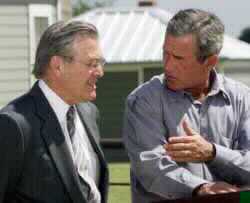HIGHLIGHTS: Bush's National Security Council Discusses Boosting U.S. Military Capabilities||Iraq Wasn't up for Discussion During Meeting||Tommy Franks and Powell Absent from Meeting||Putting Protection of Americans and Long-range Issues of Military Planning & Reform Both on Track, Major Concern||Canada Latest American Ally to Voice Doubts About Attack on Iraq|| STORY: President George W Bush has renewed calls for a regime change in Iraq, but promised that he will consult allies before taking any military action.
He was speaking to reporters after a meeting of the most senior defence officials in the United States.
"Regime change (in Iraq) is in the interests of the world," said the president. "How we achieve that is a matter of consultation and deliberation."
However, Iraq was not under discussion at the Wednesday's talks, which focused on long-term security and defence planning.
Mr Bush said that the talks - at his ranch in Texas - had focused on ways of boosting US military capabilities in the aftermath of 11 September.
Asked by reporters whether he would be prepared to go to war against Iraqi leader Saddam Hussein alone Mr Bush said there was a frenzy over the issue and that he would continue to consult friends and allies.
"We will look at all options and we will consider all technologies available to us, and diplomacy and intelligence," Mr Bush said.
TOMMY FRANKS & POWELL ABSENT FROM MEETING
The president was joined by Defence Secretary Donald Rumsfeld, Vice-President Dick Cheney, National Security Adviser Condoleezza Rice and the chairman of the joint chiefs of staff, General Richard Myers.
But General Tommy Franks, who would lead any military action to topple President Saddam Hussein, had not been invited - and neither had Secretary of State Colin Powell.
Mr Bush said the talks centred on ways to "better protect ourselves and our allies from the true threats of the 21st century," as well as how to "shape a new philosophy in the Pentagon".
Correspondents say US administration officials concede that putting the emphasis on protecting Americans in the aftermath of last year's attacks has been a distraction from long-range issues of military planning and reform.
This meeting, they say, has been about keeping both on track: an over-the-horizon review of the needs of the US military, but with a very topical edge.
The US-led war on terror has a bearing on the military budget and probably on the kind of weapons systems that will be favoured and developed in the future, the sources say.
The talks also discussed the direction of missile defence, now that the US has withdrawn from the Anti-Ballistic Missile Treaty.
The proposed missile defence system would still be designed to protect the US against the threat of intercontinental ballistic missiles.
However, in a world of rapidly changing threats, US concern today is also focused on the growing number of nations acquiring missile technology that could be used, for example, against American or allied forces around the world.
CANADA LATEST AMERICAN ALLY TO VOICE DOUBTS ABOUT ATTACK ON IRAQ
The meeting comes amid increasingly vocal reservations both at home and abroad about military intervention in Iraq.
Senior members of Mr Bush's own Republican Party have expressed opposition to the president's policy.
Canada has become the latest American ally to voice doubts about a strike against Iraq. Several European allies are also cool about a possible attack.
But Mr Bush repeated that Washington's focus remained on removing Saddam Hussein.
"One thing is for certain is that this administration agrees that Saddam Hussein is a threat and ...it hasn't changed," Mr Bush said.
PHOTO CAPTION
President George W. Bush talks with Defense Secretary Donald Rumsfeld at Bush's Crawford, Texas ranch during a news conference August 21, 2002. Bush said he would continue to consult with U.S. allies on how to deal with Iraq, saying he was a 'patient man' but remained committed to removing Saddam Hussein. (Rick Wilking/Reuters)
- Aug 21 2:55 PM ET
- Author:
& News Agencies - Section:
WORLD HEADLINES


 Home
Home Discover Islam
Discover Islam Quran Recitations
Quran Recitations Lectures
Lectures
 Fatwa
Fatwa Articles
Articles Fiqh
Fiqh E-Books
E-Books Boys & Girls
Boys & Girls  Women
Women










